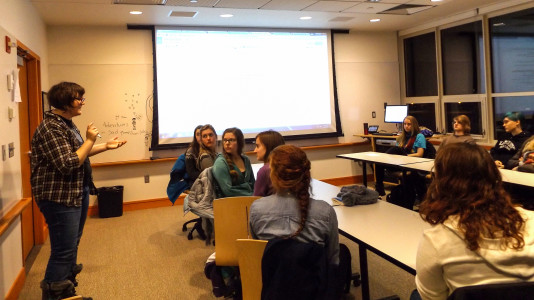
On Monday night, roughly two dozen Grinnellians gathered to discuss intersectional feminism at this semester’s first meeting of Grinnell’s Intersectional Feminist Alliance (IFA). The group aims to address existing issues on campus with more universal and inclusive solutions.
Lily Galloway and Jean Pharo, both ’17, founded the group this year in an effort to increase inclusivity in the feminist movement on campus. The two were dissatisfied by the lack of accessibility in Grinnell and decided to take action.
“We started talking about … the ways that campus just doesn’t create the best environment for everybody, and doesn’t acknowledge that … people might want the environment to change,” Galloway said.
Outraged by the movement’s domination by white, upper-class women, Pharo and Galloway aimed to recognize the diversity of experiences and challenges faced by intersecting identities of race, gender, sexual orientation and disability.
“Intersectionality and inclusion are the most important parts of feminism,” Galloway said.
“As feminism has grown and become more prominent, it’s important to include all of the identities that are affected,” Pharo added.
Both Pharo and Galloway felt particularly compelled by the lack of campus housing available to students seeking gender-neutral, substance-free and accessible provisions.
“We want anyone who runs into issues … with their intersectional identities … to know there are people out there who can support them and who will have their back when they’re dealing with the administration or with fellow students,” Galloway said. “Your identities shouldn’t make you too complicated of a person for … the college to provide your needs.”
The new group began their efforts last semester by hosting Self-Love Week, an adapted version of Grinnell’s traditional Love Your Body Week. They collaborated with many different groups on campus to organize a Pub Quiz, masturbation workshops and a clothing-optional photo shoot.
This semester, IFA hopes to include other groups on campus in their movement as they attempt to address the shortcomings of Grinnell’s sexual assault policies. At their meeting on Monday, attendees suggested everything from organizing self-defense and “how to say no” workshops to educating people on how to use the blue light emergency system. They also hope to collaborate with Dissenting Voices, a group on campus dedicated to preventing sexual assault.
“I really think that this campus needs to get better about sexual assault policy, so that’s one thing I really hope this organization can help with,” said IFA member Sam McConnell ’17. McConnell feels that the group’s inclusive ideology allows them to adequately address larger issues such as sexual assault.
“I think this group in particular is especially good because it … brings together a lot of things. Other groups deal with things individually … this group … broadly covers a lot of issues,” she said.
Pharo and Galloway encouraged anyone with questions, suggestions or ideas to reach out to IFA and get involved in their movement.
“[The group includes] people who have been into this kind of thing and been active in feminism … for their whole existence … to people who … have no idea what these words we’re using mean and want to learn more,” Galloway said.
“We want everybody to come … everyone has valid opinions and valid ideas that we would love to hear,” she said.




























































